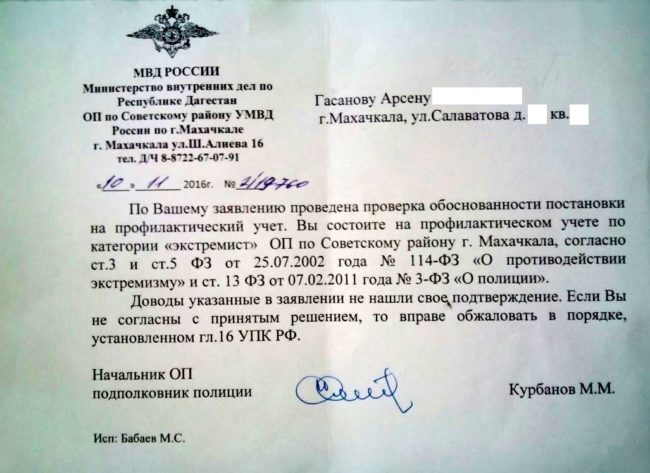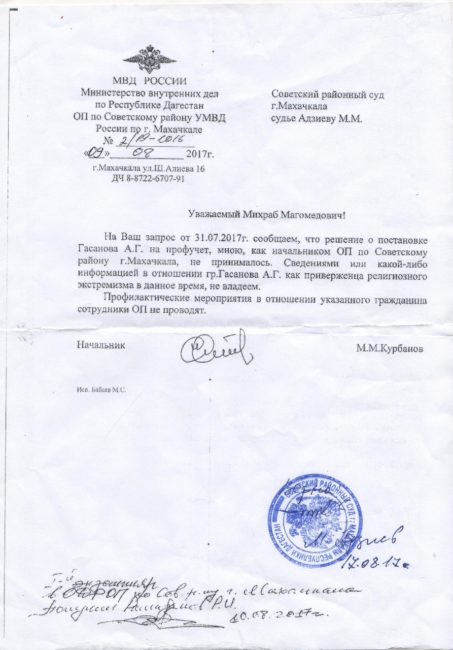

 For a year and a half, Makhachkala resident Arsen Gasanov and his family have been harassed by police. Despite going to court for an explanation of why, and the register on which he was labelled an ‘extremist’ officially being disbanded, the harassment still continues.
For a year and a half, Makhachkala resident Arsen Gasanov and his family have been harassed by police. Despite going to court for an explanation of why, and the register on which he was labelled an ‘extremist’ officially being disbanded, the harassment still continues.
How it all began
Arsen Gasanov’s trouble with the law began a year and a half ago, when he unexpectedly discovered that he had been put on the police’s ‘preventative supervision register’ in March 2016.
In the spring of last year, the 40-year-old resident of Makhachkala was detained on a Makhachkala street and taken without explanation to the city’s Department of Internal Affairs, in Sovetsky District.
There, according to Gasanov, he was questioned. Seeing officers taking fingerprints of other detainees, he quietly informed police that he did not intend to give his own.
‘To my surprise, he did not insist. When he finished writing, he gave me a paper to sign. There were moments that I didn’t really like, the way he presented everything. But at that moment I was thinking about my children and I wanted to leave quickly, so I signed the paper and left. Six months later, about three months ago, a police officer, Murad, came to our house,’ Gasanov told OC Media in January.
Murad Khalayev had learned that Gasanov was on the register from the district’s police.
[Read more: Daghestani man branded as extremist is in fear for his life]
The ‘preventative supervision register’
Putting people on the preventive register has been practised for several years in Daghestan. Russia passed a law in June 2016 ‘On the basics of the system for the prevention of violations’. It says people ‘inclined to commit crimes’ who behave ‘antisocially’ or ‘violate generally accepted norms of behaviour and morals, or the rights and legal interests of others’ fall under the radar of law enforcement bodies.
The vague language of the law gives the right to police to target any Russian citizen whose behaviour they disagree with. Their names are then put on the preventive register. As a rule, those who are put on register must report their movements and actions to district police departments. But since the law does not specify the exact procedure of working with people on the register, each police department sets its own rules.
In Daghestan, Muslims attending ‘Salafi mosques’ were most often targeted, as a rule detained on their way to or from the mosques. Several dozen people could be detained in a single raid. According to eyewitnesses, police took everyone indiscriminately. The reasons for detentions were not explained. After a few weeks or months, the detainees found out that they had been put on supervision lists.
[Read also: The courts are the last hope for Daghestanis on Russia’s ‘preventive supervision list’]
‘You are on the register under the category: “extremist” ’
Last October, Gasanov sent an official request to the head of the Sovetsky District Department of Internal Affairs, Murad Kurbanov, to confirm whether he really was put on register. In an official response dated 10 November 2016, this was confirmed: ‘You are on register under the category “extremist” ’.

In February, he filed a lawsuit to recognise the police’s actions as illegal, and oblige them to delete his name from the register. In an official address to judge Eldar Atayev, the Ministry of Internal Affairs said they had no information about Gasanov.
In late March, Daghestan’s Interior Minister officially announced that the ministry no longer kept the preventative register, and had ordered than anyone on the record would no longer be supervised after the expiration of their current order. Judge Atayev refused to satisfy Gasanov’s request.
‘I was accused of having invented everything! This court was like a farce. The defendant stated that they had no information that I was on the register. This despite the fact that we have an official response from the head of the district police department saying that I was registered as an ‘extremist’. We have all of these papers, and we will present them in court,’ Gasanov told OC Media.
An appeal
Gasanov appealed the decision of the court and a new hearing took place this summer. Another judge, Mikhrab Adziyev, again sent a request to the head of the police department. This time Murad Kurbanov replied that he did not make the decision to put Gasanov on the register.
‘We do not possess any information regarding Gasanov as an adherent of religious extremism at this time’, the official reply reads.

Sovetsky District Court once again refused to satisfy the claim, because officially there is no register anymore.
‘Gasanov understood that officially the register was cancelled. And it was important for us to receive an official response from the head of the police department in the Sovetsky District of Makhachkala that Gasanov was not registered. Such a response was received. Now, if some police officers disturb him, we can conclude that this is their personal illegal initiative’, Russian rights group Memorial quotes lawyer Murad Magomedov as saying.
The story continues
According to Gasanov, despite being officially clean, with papers confirming he is not an extremist, the district police have not left him and his family alone.
Gasanov told OC Media that on 16 October, two unknown men in civilian clothes, introducing themselves as officers of Sovetsky Police Department, came to his mother’s house. In a video shot by Gasanov’s 12-year-old niece, the men refuse to show their IDs, and when they notice that the encounter is being recorded, start knocking the phone out of the hands of the child.
In the video, the pair are heard threatening the girl: ‘do you know the new law? You will be jailed for this. Little child, you will be put on the register. Which school do you attend?’
According to Gasanov, such visits have been going on for a year. At first, only officer Murad Khalayev of the Sovetsky District Department of Internal Affairs contacted him. He demanded Gasanov come to the police station and take a DNA test, and give fingerprints and a voice sample. Later, other men began coming to his home.
‘The other day, Murad called again. He said he wanted to come to me. I asked why. He replied: ‘Let’s talk’. I told him I have an official response from his boss stating that I was not on the register anymore. So, he is acting on his own initiative now?’ Arsen Gasanov asks.
Neither Arsen, nor his lawyer understand what exactly the officers want. This is why they are surprised that they have continued demanding he come to the police station with no legal grounds.
Sovetsky Police Department did not respond to OC Media’s request for comment. The officer responding to the call said that ‘everyone is in the field’, promising that someone would call back. No one did.
‘The fight must continue’
The chairman of Memorial, Oleg Orlov, called the actions of the officers from Sovetsky District illegal. According to him, Gasanov is not the only person from Makhachkala who is facing this situation.
‘This is completely illegal. Formally the register was cancelled. There is an official response from the Ministry of Internal Affairs. The Minister of Internal Affairs of Daghestan said there is no register of ‘extremists’ or ‘religious extremists’. But there are facts — Arsen Gasanov and other cases known to us indicate that the practice is partially preserved. If this is conducted unofficially, then this is a double violation of the norms of the law’, Orlov told OC Media.
He does not see a ‘personal initiative’ in the Gasanov’s case, saying police always act on the orders of their superiors, who in turn ‘act on the basis of some instructions and some regulatory acts’. Orlov suggests that despite the formal cancellation of the register, they have decided to continue it informally.
He notes that after it was officially announced that the register was abolished, large-scale detentions ceased. However there are still isolated cases. Orlov says the fight must continue, with appeals of the illegal actions of police and demands for a clear explanation of what legal documents they are basing their actions on.






